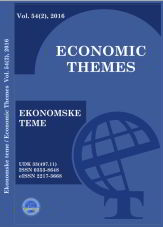Economic Themes (2016) 54 (2) 6, 281-300
Biljana Đorđević
Abstract: In today's business conditions, the internationalisation of business becomes an almost inevitable precondition for future growth and development of organisations. However, internationalisation of business usually requires organisations to implement some changes in the way they operated in the previous period. One of the areas that require some changes is the area of human resource management, too. Factors which require modifications in this system are related primarily to the legal regulations of other countries, but also to the characteristics of their national culture. The former influence comes from the fact that national culture exerts a powerful influence on the system of values, attitudes and behaviour of people in a particular country and, among the other things, on the preferences for policies and procedures in the field of human resources management. Starting from the above, this paper analyses the impact of certain dimensions of national culture on the preferred content of human resources management in organisations in certain countries. The aim of the paper is to provide the theoretical basis for organisations that internationalised their business, or intend to do so, to create system of human resource management in the entities abroad which, at least, will represent the balance between the system that is applied at headquarter and one that is preferred in entities abroad, in order to be effective.
Keywords: internationalisation; national culture; international human resource; employees
IMPACT OF NATIONAL CULTURE ON INTERNATIONAL HUMAN RESOURCE MANAGEMENT
Biljana Đorđević
Abstract: In today's business conditions, the internationalisation of business becomes an almost inevitable precondition for future growth and development of organisations. However, internationalisation of business usually requires organisations to implement some changes in the way they operated in the previous period. One of the areas that require some changes is the area of human resource management, too. Factors which require modifications in this system are related primarily to the legal regulations of other countries, but also to the characteristics of their national culture. The former influence comes from the fact that national culture exerts a powerful influence on the system of values, attitudes and behaviour of people in a particular country and, among the other things, on the preferences for policies and procedures in the field of human resources management. Starting from the above, this paper analyses the impact of certain dimensions of national culture on the preferred content of human resources management in organisations in certain countries. The aim of the paper is to provide the theoretical basis for organisations that internationalised their business, or intend to do so, to create system of human resource management in the entities abroad which, at least, will represent the balance between the system that is applied at headquarter and one that is preferred in entities abroad, in order to be effective.
Keywords: internationalisation; national culture; international human resource; employees

